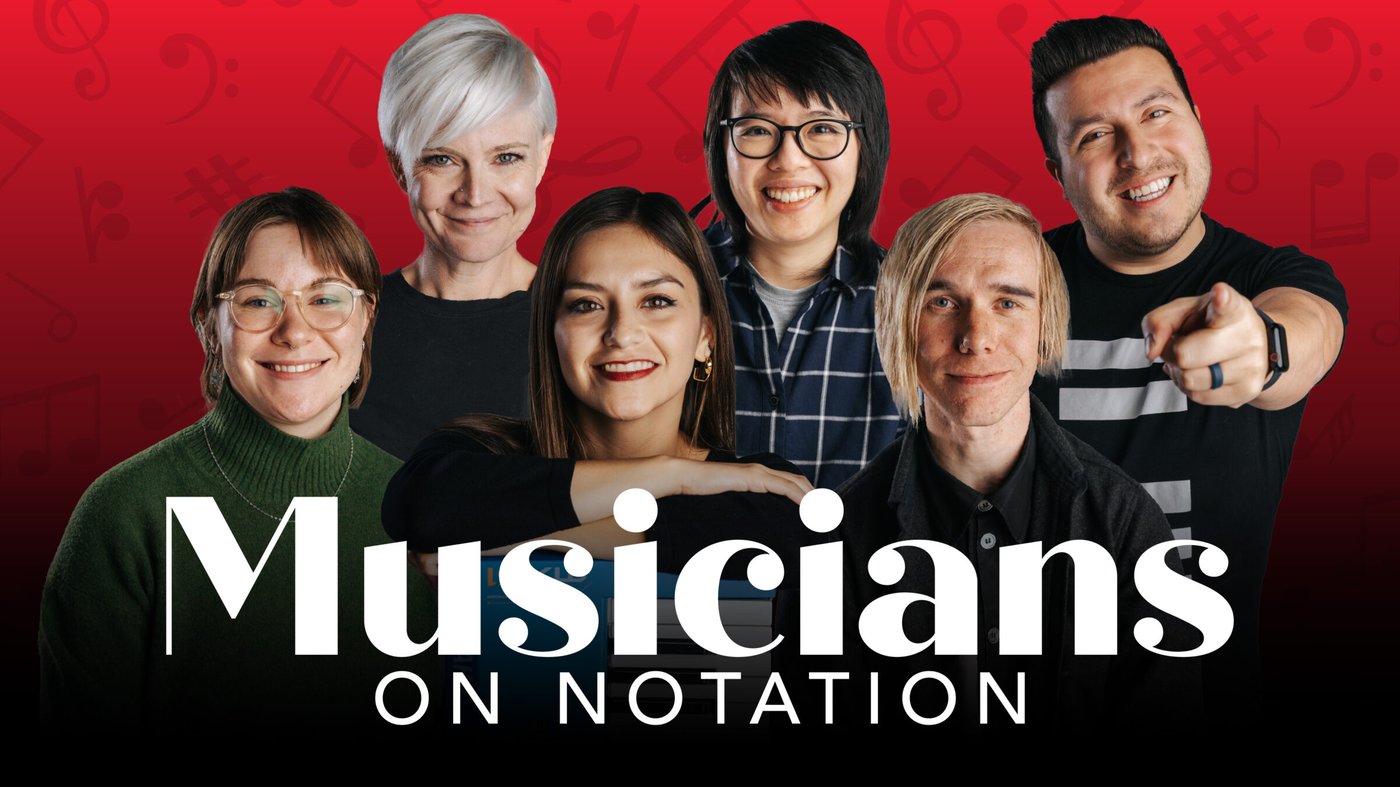
Traditionally, classical piano lessons emphasize notation. But you may have heard that world-class musicians like the Beatles and Taylor Swift never learned how to read music. So how important is reading sheet music, really?
This is a big question! So we asked people who work with music every day. The following are interviews (edited for length and clarity) with the musicians who work behind the scenes at Pianote. We hope you’ll find their answers fascinating and inspiring!
Table of Contents:
Get exclusive interviews, fascinating articles, and inspiring lessons delivered straight to your inbox.
Pianote Job: Media Manager
Side Gig: Touring pianist and keyboardist
Educational Background: Initially taught by dad, who is a pianist. Quit because he didn’t want to practice. Picked up piano again as a teen, crash-coursed himself with YouTube tutorials and theory books, and earned a Bachelor of Music in jazz and contemporary popular music.
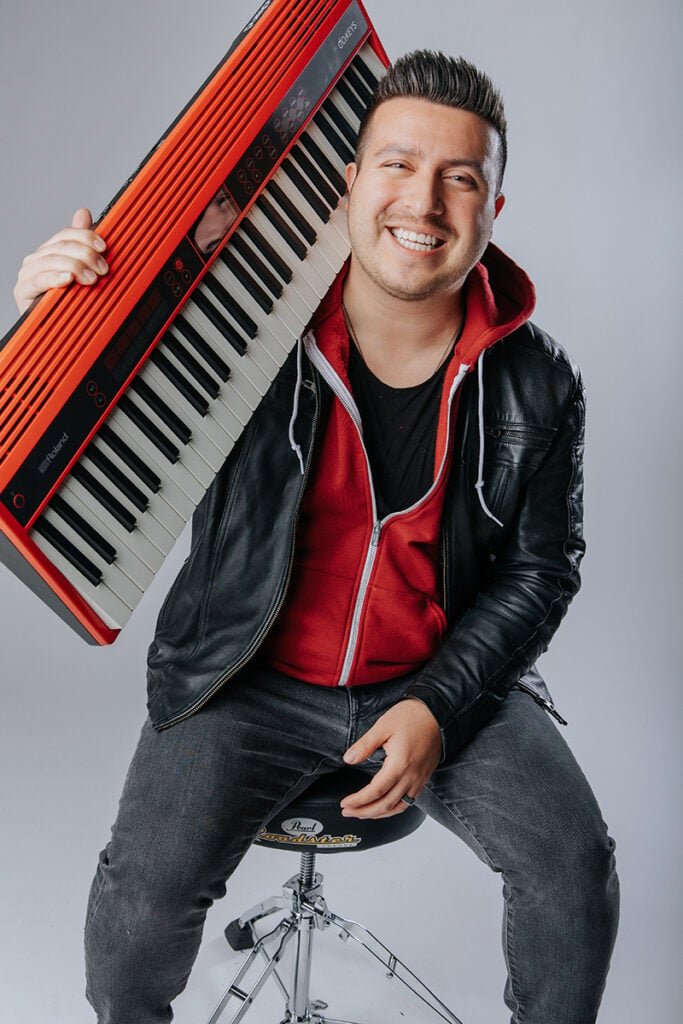
Whenever I hear music, I see it in my head written as sheet music.This has helped me when it comes to transcribing, because that was my first gig at Pianote: transcribing Jesús Molina.
When it comes to gigging, it’s really important to be able to read music. At least learn how to read the melody. This will inform your decisions when it comes to voice leading and how to arrange the song.
It’s a very fundamental skill for a piano player. I was always told you shouldn’t alienate yourself from job opportunities (like musical theater, pit band, or accompanist) by not knowing how to read.
I’ve always struggled with this because I think it’s extremely important to read music…but I don’t think it’s the only thing you should do.
I think too many people get into a box in their head where all they can do is read sheet music. It’s a great skill to have! But breaking out of that box becomes harder once you’ve ingrained that into yourself.
I wouldn’t say it’s a make-or-break thing. Try to find the balance between working on sight-reading and the things that make you happy when you play piano (sight-reading does not bring me joy—that’s my honest answer!).
I would encourage people to explore different types of sheet music, such as sheet music with the chord names on top. Or try singing the melody while playing the chords.
There’s more than one way to read sheet music. And there’s more than one way to play piano.
Pianote Job: Publishing Specialist
Side Gig: Plays piano and guitar for fun and sings in a local choir.
Education: Started playing at four or five. Completed RCM 8 and Advanced Rudiments exams. Studied piano, music history, and theory at Laurier University. Holds a Master’s in musicology.
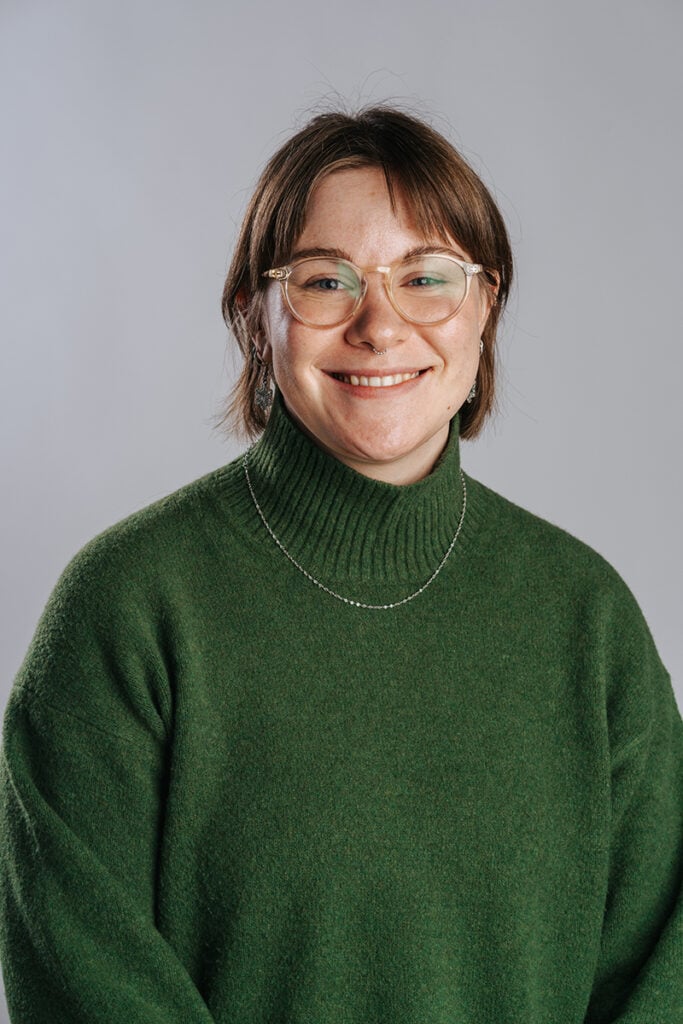
My job is making sure there are no mistakes in the notation we publish, so if I didn’t know how to read music, it would be really hard to do my job! And I like to play through the sheet music if I’m looking for errors because it’s the easiest way.
In my choir now, it’s a lot of sight-singing. Which I think is a lot harder than sight-reading on the piano! I learned solfege in my undergrad and I use those skills for choir too.
I know people who don’t read music and are excellent musicians. It depends on what you want to do: if you want to play in an orchestra, you should probably know how to read music. If you want to play in a band, you probably don’t need to but reading chords and understanding chord progressions would help.
I think if you want to be a well-rounded musician, have a little bit of everything. But it’s not like an old dog can’t learn new tricks. Anyone can work on any of these skills at any point in time.
Work on your ear training. Understanding intervals changed my entire relationship with reading music. And there are lots of resources online: Teoria is a great website!
Pianote Job: Social Media Manager
Side Gig: Co-founder of Arietta Entertainment, gigging pianist/keyboardist and piano teacher
Education: Started piano lessons at age 7. Attended a conservatory (ESMDM) for four years, then studied with Natalia Tibets for five years, competing in national youth contests. Played in musical theatre plays, participated in composition contests, and learned multiple music genres “in the streets”.
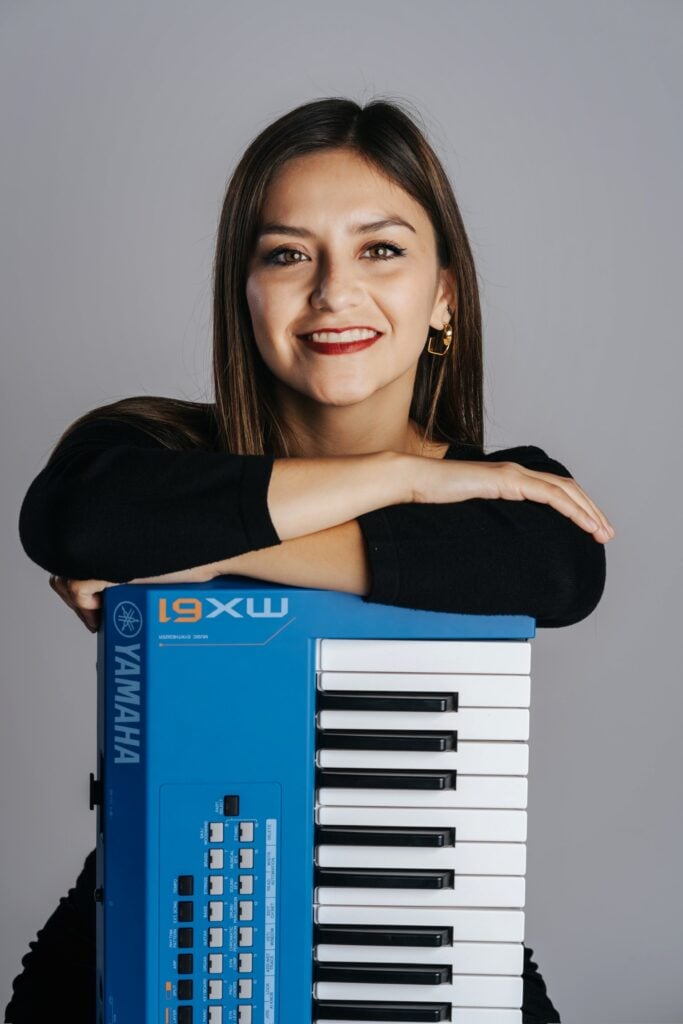
Reading music helps me verify song tutorials, technique exercises, and arrangements before posting on Pianote’s socials.
At my agency, we rarely use sheet music.
I think it comes down to the genre you’re playing. For classical and musical theater, it’s essential. Jazz musicians use it for transcriptions, but in rock or pop, it’s less common.
I think it’s very useful for musicians to start ear training from an early age, because the perfect balance is to have both these abilities develop at the same level.
Lisa’s acronyms are a great starting point. So check out our sight-reading tutorial on YouTube!
Read sheet music with the music playing. I think seeing that relationship of when notes go high or low is very helpful.
Start with a piece you love. There are many simplified versions of everything so you don’t have to study Clementi if it bores you! Go ahead and study John Legend but with sheet music. It’ll be a nice experience.
Pianote Job: Transcription Specialist
Side Gig: Gig musician and composer.
Education: Grade 10 RCM, Bachelor’s degree in piano performance, Master’s degree in music composition.

I’m looking at music scores constantly! I compare what other musicians have done, try it out, and see what works. And as much as my goal is to transcribe almost exactly what I’m hearing, that doesn’t necessarily translate to what’s most playable for a student or what fits the hands nicely, or what’s most pianistic.
However, I have a much stronger ear as a musician than an eye, and that obviously comes in handy for this job.
It can be really beneficial depending on your musical interests. Anything in the classical tradition is a cultural project that requires reading music to participate in. And presently, there isn’t a methodology that teaches the classical canon without notation (I’d be curious to see if anyone’s attempting to do that!).
It’s also the case for anyone interested in being a gigging musician. Different ensembles have different standards, but I think your ability to enter into that world would be made easier with the ability to read notation.
I recommend people take daily time to read music. I try to sit down and sight-read as often as possible.
Don’t allow yourself to stop. Something I did when I used to teach piano was cover up each measure as the student was playing, forcing them to keep moving!
Pianote Job: Content Marketing Strategist
Side Gig: Plays piano for fun and takes jazz piano lessons.
Education: Began private lessons at age six. Holds RCM Associate diploma. Picked up guitar as a teenager. Currently taking jazz lessons.
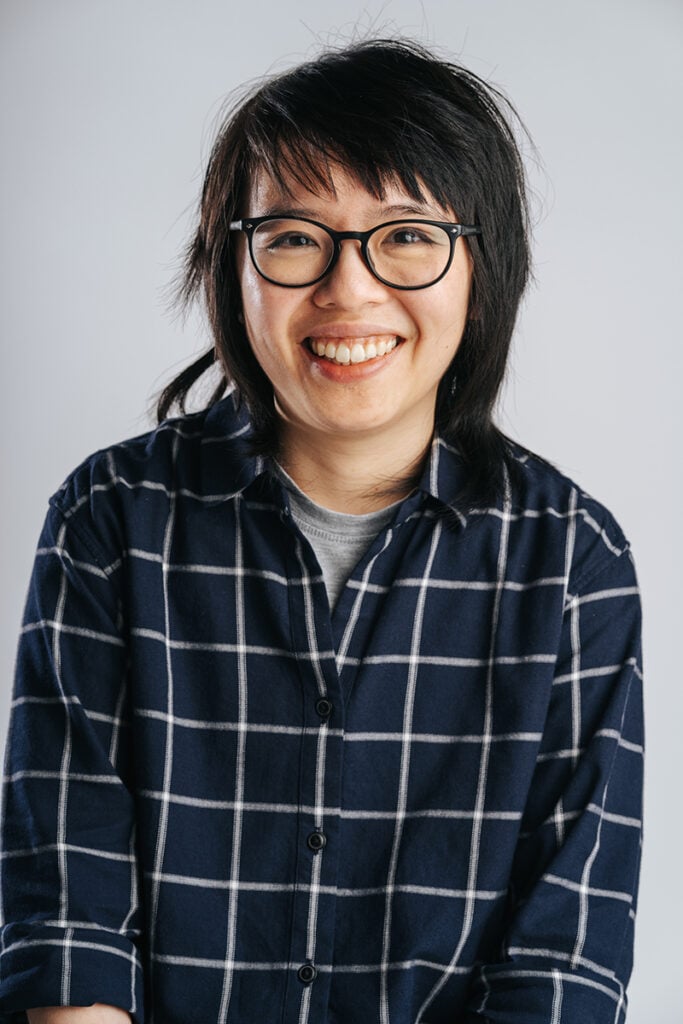
I describe my job as making our pages as visible on Google as possible. For example, if someone asks Google “what is a dominant 7th chord,” I write content that answers that question. Knowing how to read notation definitely helps.
But at Pianote specifically, we use chord symbols a lot. I didn’t learn that in my classical piano lessons; I learned that stuff from guitar. And that’s knowledge I use every day at this job.
There are things I can’t do that people who can’t read music can do, and to be honest I envy them! I can’t recreate melodies by ear first try. And jam sessions give me anxiety because I feel untethered.
And honestly, playing by ear, improvising, and jamming is what music is all about. So if all you can do is read sheet music, you’re missing out on a lot of what music has to offer.
But knowing how to read notation is super convenient. I can play most things put in front of me if it’s not too hard, and that’s super handy!
Think of music as a language. In Western music tradition, notes are letters that make up chords, which are words. Patterns like sequences, scales, and arpeggios are sentences. And theory is the grammar system music is built on.
Just like learning languages, the more you practice the better you get. So be patient. It takes time!
Pianote Job: VP of Pianote
Side Gig: 100% focused on Pianote now, but used to gig and play at church.
Education: RCM Grade 8, church bands, and mostly self-taught.
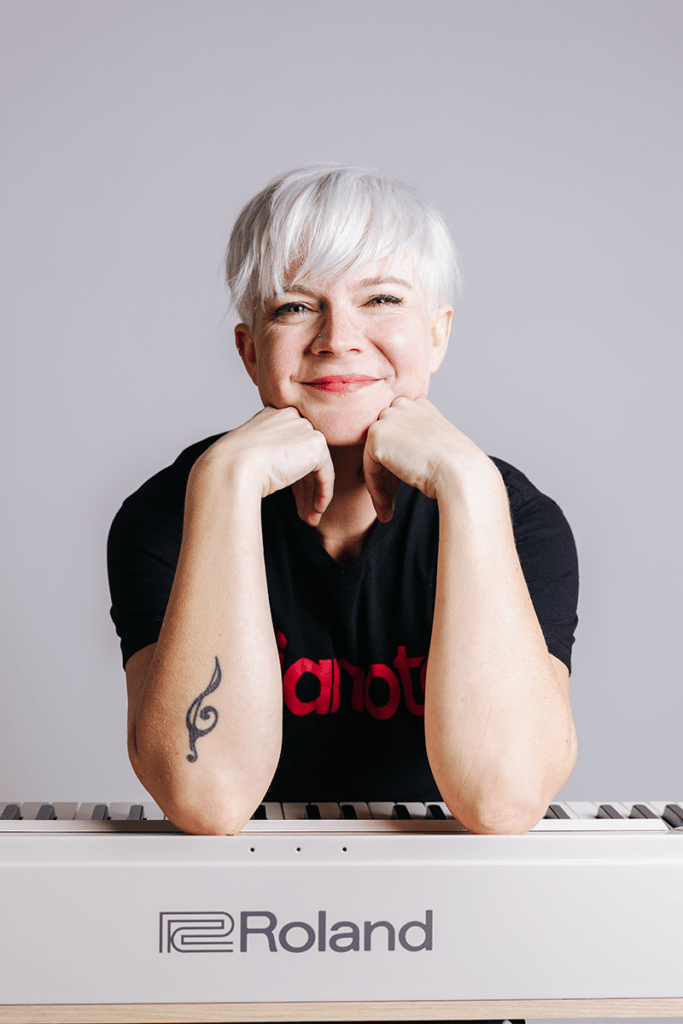
Even though I generally don’t read music as a part of my day-to-day, I still have to communicate in the language of music because I’m in this professionally. I have to teach people to understand music, and being able to read music gives you that language.
I think it’s fully optional. My belief is that you don’t need to read music to play music. I would argue that in some cases not being able to read music is a blessing.
Learning to read music was extremely difficult. I hated it.
But. I now make the choice to sit down and read music. I think a big misconception is the difference between reading music and sight reading. I think people would have a very different experience if they knew this because you can actually learn to read music rather quickly. And if you are passionate about a genre like classical, the fact that you want that skillset will make a huge impact.
On the flip side, even if you want to play pop music, there have been many occasions where I was not able to sound out something by ear, and so I would refer to notation. So, reading music has been very helpful even for a person who leans more toward using their ear.
I think it’s mostly about not judging your experience with it. With Read Notes in 30 Days, the whole point is you show up, you’re introduced to these patterns, and you do your best. You’re not expected to play perfectly.
Success is not measured by playing every note correctly, necessarily. And you learn best by playing music. So find music that inspires you and you’ll be super motivated to figure out these notes.
We’re building neural pathways in our brain. That doesn’t quickly! It took me a lifetime, but nowhere on that journey did someone say “she’s not a musical person” or “she shouldn’t play piano.” I had different strengths.
Now I sit down and read and play Chopin and I’m actually not bad at it!
Learn the language of music with flexible, daily guided workouts, ongoing support, and weekly workshops. Reserve your spot today!
SIGN UPPianote is the Ultimate Online Piano Lessons Experience™. Learn at your own pace, get expert lessons from real teachers and world-class pianists, and join a community of supportive piano players. Learn more about becoming a Member.


By signing up you’ll also receive our ongoing free lessons and special offers. Don’t worry, we value your privacy and you can unsubscribe at any time.
We use cookies for traffic data and advertising. Cookie Policy »